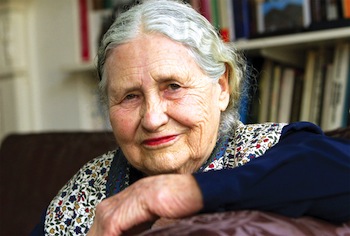Fuse News: Remembrance — Nobel Laureate Doris Lessing
By Harvey Blume
Doris Lessing died yesterday and people who have not have been in touch for some time contact each other just to say, “Doris Lessing died.” She was that important to that many of us. Yes, she was ninety-four but that did nothing to lessen the blow, the personal hit of grief, the need to say to whomever might understand: “Doris Lessing died.”
Lessing got the Nobel Prize for literature belatedly, at the age 88 — the details of why it took the Nobel Committee so long to arrive at such a foregone conclusion are irretrievably buried in shameful Nobel murk and miasma — only to scoff at it, saying in would just get in the way of her writing anything again, which, so far as we know, it did.
There are Nobel Prizes and Nobel Prizes. In a way, Lessing’s Nobel Prize was not only belated but incommensurate. The real award, one hopes, will come from literary history/posterity. Only literary priggishness of various kinds stand in the way of her being read as she ought to be. Literary priggishness was always in her way.
She was one of the finest writers about the entanglement of leftwing intellectuals with Communism, on a level, perhaps, with Sartre and Milosz, and better than Sartre.
She wrote splendidly about ageing — none better. Though aging is now a literary theme, she wrote about it without pathologizing it. She didn’t require labels like Parkinsons, or Alzheimer’s or Dementia to take it on, not that such descriptors are invalid, hardly, but to say she saw the process and its sorrows and losses, however described and treated, as unavoidable functions of mortality.
There are writers who are supremely gifted at transmuting and expressing the vectors of time, place — history — in their fiction, Philip Roth and E. L. Doctorow being two who spring easily to mind. Lessing did that and more: when historical space and time felt confining, she availed herself of the modalities of science/speculative fiction to include geological eras, pre- and trans-historical time. Lessing used climate change as backdrop to explore the nature of humanity in several of her books, the kinds of books the likes of Gore Vidal dripped scorn on for having violated the strictures of literary fiction as he conceived it.
Then there are those who say she was unpolished as a stylist. They are basing that assessment on The Golden Notebooks, in which unpolished expression was her style of choice. These particular literary prigs miss the fact that she could write in other ways, and that Love Again, for example, is a work of exquisite lyricism.
Lessing transcended categories and baffled critics, touching readers who knew her for the one-of-a kind writer that she was.
I had the pleasure of interviewing Doris Lessing twice.
In my first encounter, in the flesh, I tried to scare her just a bit, and just for fun, succeeded, briefly.
Harvey Blume is an author—Ota Benga: The Pygmy At The Zoo—who has published essays, reviews, and interviews widely, in the New York Times, Boston Globe, Agni, The American Prospect, and The Forward, among other venues. His blog in progress, which will archive that material and be a platform for new, is here. He contributes regularly to The Arts Fuse and wants to help it continue to grow into a critical voice to be reckoned with.
Tagged:

